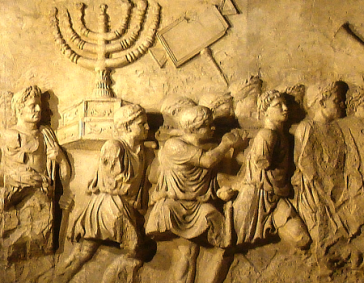 Recent conversations with friends about the nature of God’s inspiration of the Scriptures (2Tim 3.16’s “All Scripture is God-breathed”) occasioned a few thoughts which I’d like to share. I’ve previously expressed my sense of how God is present in and experienced through the reading of Scripture. See our What is the Bible?—Part 2, which says:
Recent conversations with friends about the nature of God’s inspiration of the Scriptures (2Tim 3.16’s “All Scripture is God-breathed”) occasioned a few thoughts which I’d like to share. I’ve previously expressed my sense of how God is present in and experienced through the reading of Scripture. See our What is the Bible?—Part 2, which says:
(4) CANONIZATION OF HISTORY. In choosing a particular man and his descendants to be the sufficiently truthful context into which God would incarnate, God chooses to identify himself as a covenant partner with Israel, and that means with her successes and failures, with the truth they perceive and the falsehoods they embrace, with the violence they pursue and the good they manage to achieve. It all gets chosen by God as the space in which God’s incarnational and redeeming work is embodied. This space is fallen but not so hopeless as to be void of all truth. God remains committed and engaged. In choosing Israel God is choosing the whole world. He simply chooses to work within this nation with respect to securing a context adequate for the Incarnate One who will mediate God’s purposes universally.
We are thus arguing for the canonization of Israel (as opposed to her texts per se) as the sacred space within which God creates the conditions sufficient for incarnation. Are the OT ‘texts’ inspired? In the sense that these writings are the written record of that created covenantal space God has sanctified for pursuing his incarnational purposes, yes. And it’s a mixed history; a history of misconstrual, of despairing nationalism, of religious hubris, but also of honest praise and humble dependence upon God. It’s a history that sufficiently succeeded at preserving the socio-religious conditions necessary for incarnational vocation. Israel is that space in the world where God does not give up on carving out a worldview sufficient for incarnation. They got it right enough for what ultimately mattered.
I come back to these thoughts regularly, and here I’d like to think aloud again on the nature of Scripture as “inspired.” Growing up, you might have played with magnets and metal shavings. Run the magnet underneath a paper on which rest shavings and the attraction moves the shavings now this way, now that. It’s just an analogy, mind you, but imagine God’s inspiring presence a bit like the effect upon shavings of the presence of a magnetic field. The attraction orients the shavings. Given the presence of other factors/attractions, the shavings will be variously directed. Let us say that as the source and ground of being, God is an abiding, ever-present aesthetic field of attraction. Imagine here the transcendent presence of God establishing us in a teleological orientation in/toward God as the good. That much is metaphysically the case of all things. This much embraces all texts – the Bible, the Bhagavad Gita, the Zend Avesta, the Nag Hammadi, the Quran, everything. On this level – every text. Why? Because God is the grammar of the being of all things. All rational and aesthetic appetite is a response to the orienting presence of God’s Spirit at work. I consider it a weakness of most theories of the inspiration of Scripture that they do not begin by assuming this much, or worse, they begin by denying this. Creaturely freedom will mean some religious traditions more accurately approximate their transcendent/teleological orientation; we are free to misrelate to a certain extent within an overall aesthetic orientation. But to misrelate out of all transcendent teleological approximation?
What’s this got to do with the inspiration of the Bible? Well, like all human expression, the Bible manifests the transcendental good of being. But is the Bible more unique, more specifically inspired than what is generally true about all faith traditions? Do we need to even suppose such a thing of the Bible? I think so, yes. How might we understand this uniqueness? Let me suggest that what makes the Bible unique (among other things) is not anything God is doing in the authors when they compose their texts. This is different than supposing divine inspiration to be about how God gets texts written. Indeed, texts can be written on occasion in a matter of hours. But they are inspired over some length of time.
 I understand the doctrine of the inspiration of Scripture to be not about what God is doing in the composition of texts in order to make the text say something or other, but rather about what God does (far from papyrus and ink) to compose authors who will perceive something or other and be changed by what they see. That they will write who they are is an almost uninteresting given. That they are who God makes them to be over time is where the inspiring gets done — “out there” in the market, at Temple, at prayer, harvesting grain, slaughtering sheep, reconciling neighbors, returning from war, suffering, observing, watching, experiencing and pondering life in light of what faith one has. What makes the Bible (really, any book) unique in any sense worth being ‘unique’ is its content and the effect it has upon those to live it, not the mode of its composition.
I understand the doctrine of the inspiration of Scripture to be not about what God is doing in the composition of texts in order to make the text say something or other, but rather about what God does (far from papyrus and ink) to compose authors who will perceive something or other and be changed by what they see. That they will write who they are is an almost uninteresting given. That they are who God makes them to be over time is where the inspiring gets done — “out there” in the market, at Temple, at prayer, harvesting grain, slaughtering sheep, reconciling neighbors, returning from war, suffering, observing, watching, experiencing and pondering life in light of what faith one has. What makes the Bible (really, any book) unique in any sense worth being ‘unique’ is its content and the effect it has upon those to live it, not the mode of its composition.
The Scriptures derive their unique inspiration from God’s commitment to be in a unique covenant relationship with Israel, a relationship that reduces to essentially the same divine presence in all human expression (what other presence could we even consider?) but which in Scripture is different and which difference secures the relevant outcomes God wants, and that difference is the covenantal context of Israel’s life out of which texts naturally emerge. God makes the formation and journey of Israel (as opposed to Hinduism, Buddhism, Zoroastrianism, or Greek paganism) the context in which he intends to Incarnate. It is this unique intention to become a human being, and only this, which explains the Bible’s unique character, because it is Incarnation that calls for a peculiar human partnership as its proper and sufficient context.
Some human partner has to stand on the human side, a partner who agrees to enter into this representative space. This person has to understand what he’s doing and exercise faith and trust. Why? Because that faith and the narrative that creates it (and, in a sense, the narrative it creates) become the context for the community that grows up around it, constituting that community’s identity and defining its purpose. God gets this with Abraham. From Abrham’s faithful abandonment to God, God commits to bring out into the open all the issues and truths representative of the whole of humanity and to do so progressively as the community (Israel) that identifies itself with Abraham’s faith continues to grow increasingly into a deeper understanding of the God who called them into covenant. That progress is massaged carefully and lovingly by God for the purpose of Incarnation. The production of ‘texts’ is the one thing God doesn’t have to worry about. Texts get written by every community. It’s what human beings do. We’re story tellers. Over time, enough of the truth needing to be said gets said, and in the fullness of time the Incarnate One will arrive. And he did.
If all Scriptural texts are ‘inerrant’ in the common sense we take it, if God can secure that kind of error-free worldview, then there’s no explaining biblical history as we know it. God could have dropped down into any inspired maiden’s womb and produced an inerrant incarnation at will — poof. But that didn’t happen. And it didn’t happen because it couldn’t happen. And it couldn’t happen because of what incarnation means — God truly becoming a human being whose sense of identity and purpose, whose values and vocation, develop through the same developmental stages and vulnerabilities that every human being journeys through.
So what about those texts? Well, they’re going to be as hit and miss as Israel was hit and miss throughout her journey. Those texts are Israel’s journey. Inspiration doesn’t make them something else. Inspiration makes Israel increasingly something else, something unique. But that takes time, and there is genuine evolution in the text until Israel’s faith and tradition arrive at their (and our) ‘end’ in and as the One who in the fullness of time (and texts) came to be personally present in Christ, God’s Word.
I like this.
The whole of the authors’s lives are what is inspired – they write out of that. They misunderstand and misrepresent at times, but there is a progression (as there always is in God’s dealings with us) it is this progression to LOVE that is vital that we discern.
I think inspiration also, importantly, occurs at the point of our reception of the scripture too, when we open ourselves to trusting the God Jesus reveals the Holy Spirit reveals meaning.
Incarnation (rather than simply crucifixion) is our salvation. It is the best way for us to focus on and create relationship, which is what God (? Is, and) wants most for us to share.
Relationship with others and God (through others) is the purest expression of salvation, I believe.
Thanks Tom.
Blessings.
LikeLiked by 2 people
Incarnation, cross, resurrection. All vital parts, I believe.
LikeLiked by 1 person
An interesting take on inspiration. 🙂
LikeLiked by 1 person